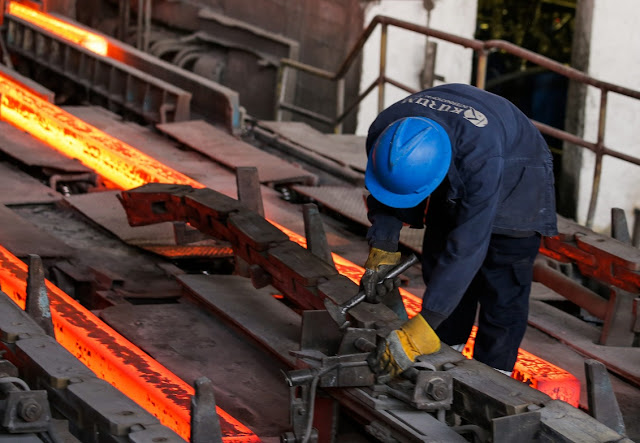 |
| Worker at the Kurum iron factory in Elbasan |
High energy prices for businesses are having the first effects on the performance of large enterprises, which have energy as a major item in their costs.
Kurum, the third largest company in Albania by revenue, after OSHE and "Kastrati group" as well as the largest exporter, has temporarily closed its steel and rolling mill since the beginning of August. The rolling mill will start on October 1. While the steel factory will restart if energy prices fall, or the price of iron rises above 1100-1200 euros per ton, from around 700 euros, which is today.
Arif Shkalla, economic director of Kurum, told Monitor that the main reason is related to the expensive price of energy, since steel cannot be produced when energy has reached 750 euros MWH, and a ton of steel is sold for 700 euros. According to him, with iron prices that are around 700 euros, the energy should drop to 200-250 euros/KWH for the factory to be efficient.
Shkalla says that producing 1 ton of iron requires an average of 730-750 kilowatts in total. "So if the price reached 870 euros in August, the direct cost of energy is 652 euros per ton, when the final iron as a product on the stock market was 650-680 euros in August.
At the moment the company is importing iron or ingots to work in the rolling mill.
Shkalla says that the same situation exists in Europe, where many factories are closing. The second largest steel producer in the world, ArcelorMittal has announced that it has closed a plant in Europe due to rising gas and energy prices.
Kurum also owns the Hydro Power Plants (HPPs) of Bistrica and Ulzë. The two HPPs in Bistrica are working, while Ulza is not working because there is no water and the rains are expected.
At the moment, Kurum is importing and trading and only one factory is open. Shkalla said exports have continued, but do not compare to last year's levels. While in September, no exports are expected and the hope is that the activity will resume in October. Shkalla says that the demand for iron has fallen, while Kosovo is securing iron from other markets and importing directly through the Port of Durrës.
Shkalla says Turkey is competing with the price of iron, as companies there continue to get free energy from the state. "The state still gives factories in Turkey gas for energy production at 140 USD/ MWH, becoming strong competitors in Europe.
In 2021, Kurum's revenues reached 42 billion leks, according to the official balance sheet, almost doubling compared to the previous year, as the company recovered from the pandemic and demand increased in Europe. Shkalla says that despite the closure of the steel factory, Kurum has guaranteed income from energy and therefore there will be no liquidity problems for bank payments and installments, but the good thing is that all the factories are working. The closed factories account for 75% of the company's turnover, but the increase in energy prices still favors HPPs. The latter brings about 20% of profits.
Kurum employs about 750 employees, including those who work at HPPs. While not including employees at HPPs, the number of employees is 670, of which 100 are administration, sales, and engineering staff. Shkalla says they are still being kept on the job, with paid leave. Some of the employees are working in maintenance and scrap processing. "Almost half start on October 1 and the remaining part will be with 60% in agreement with the union for 3 months", says Shkalla.
